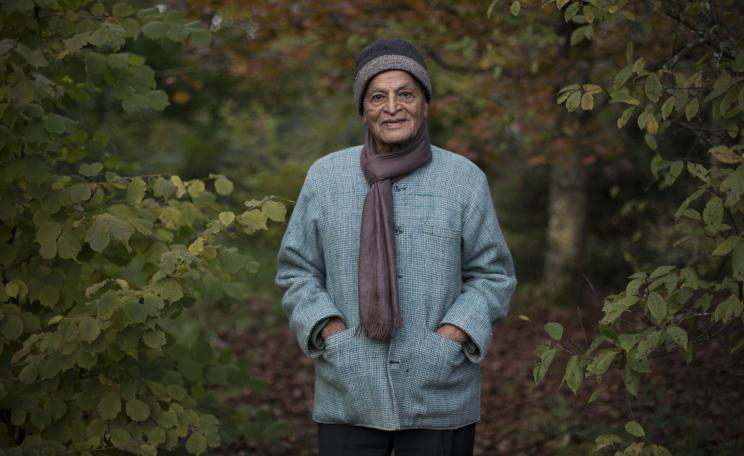Photo by Jadwiga Lopata
To survive, 'big enterprise' must dissolve into units composed of many smaller parts
'We want massive investment in large scale wind and tidal energy. Can you help us?' reads a quarter page advertisement from the UK Green Party, published in the Centre for Alternative Technology's summertime edition of Clean Slate magazine.
'No, we can't help you' would be my immediate reply. Something is definitely wrong here: 'massive investment' and 'large scale' are a far cry from a real solution to our critical planetary malaise. Indeed, 'massive' investment is arguably exactly what got us into so much trouble over past decades of 'throwing money at the problem' in attempting to conjure solutions to seemingly intractable problems.
Small is Beautiful
'Small is Beautiful' may not impress the current Green Party, however the party's origins are closely identified with Fritz Schumacher's deeply influential writing and work. And quite rightly so.
Pivotal to Schumacher's central thesis is the observation of 'appropriate scale' in the design of all technologies, their output and their ownership. An observation which extended also to building and architectural design. He famously once stated that no building should be built taller than the tallest tree in the immediate vicinity. An argument based on the insight that when things get 'too big' they not only become inhuman - but eventually implode upon themselves. This basic law of physics applies equally to green technologies as to fossil fuel models. To survive, 'big enterprise' must dissolve into units composed of many smaller parts - and this shrinkage is exactly what we should now be focussing on.
Fritz Schumacher spoke of the need for 'appropriate technologies' having a strongly human feel to them: fun, diverse, adaptable, easy to build (using local materials) and affordable.
It is my intention to emphasise the absolute validity and timeliness of these ideas. The urgent need to counteract the effects of fossil fuel driven pollution of our seas, rivers, atmosphere and soils, coupled to the challenges presented by post peak oil and climatic destabilisation, demand truly radical innovation of both 'thinking and doing' as many of us are surely aware.
But such innovation is not about replicating the centralised distribution patterns of vast, conventional, corporate-sponsored power grids. Pumping green energy into these edifices and then thinking that the job is done - is no more of a solution than selling organic food through hyper and supermarket chains. Neither can be claimed as any answer to the socio-economic, ecological and cultural disintegration that results from pandering to our consumer obsessed society. In fact such approaches do more to contribute to the problem than to solving it.
As long as we remain in servitude to an energy model constructed around maintaining the demands of an over-stimulated consumerist mind set, the message of Small is Beautiful will go unheard.
A new Renaissance
To survive, 'big enterprise' must dissolve into units composed of many smaller parts
Right now, we are presented with a once in a lifetime chance - I would prefer to say 'imperative' - to disengage from the entire top-down power-obsessed pyramid that holds our world to ransom, and to turn things on their head: we need a people led 'Renaissance' that builds a 'new democracy' even while the old one thinks its still in charge!
A Renaissance of bottom-up entrepreneurship; locally inspired and executed. A 'taking back' of responsible powers of self-governance by those who do it best: ourselves. Powers that have been calculatedly stolen from honest working people by an unholy alliance of global financier clout and political connivance - which shows no signs of abating.
The emerging pulse of the 21st century is throwing up an increasingly stark choice: A New Renaissance of humanitarian self realisation and cooperation.. or .. a continuing slide into an Orwellian 'Bland New World' in which civil liberties, humanistic expression and spiritual aspiration are ever more confined, policed and overseen by governments held to ransom by their corporate masters. A world where genetically modified foods and eugenics inspired laboratory babies usurp the laws and call of nature.
Readers of The Ecologist, including myself, know which of these futures they are seeking to build.
But do we know how to do it?
Power to the people
I have endeavoured to lay out the essential bones of 'how we can do it' in a recently published book entitled Changing Course for Life - Local Solutions to Global Problems. In it, I take us on a swift journey though the historical background to the crisis currently facing all realms of our society and then offer clearly outlined steps for how we can engage in building a new renaissance in agriculture, education, economics, science, art, health, the law; as well as in socio-political and spiritual arenas, urban greening .. and beyond. On the book's internet site I suggest 'a plan' for the formation of a 'people's movement' to take back power in the regions.
The reason for covering such a wide field is because the rot has penetrated so far into the ailing trunk of our western civilisation that only root and branch reform of all areas affected can bring about a true transformation. And I believe it is a true transformation that we - and our beautiful polluted planet - are really longing for, not a half way house.
It is a process of both inward and outward transformation, simultaneously set in motion and steadily manifest. The process is already under-way. We just need the courage, conviction and compassion to keep going and to unify our disparate green shoots into an unstoppable critical mass that will sweep aside the old regimes and set us - and our planet - on the new course which is our true destiny.
Julian Rose is a farmer, writer, holistic thinker, broadcaster and activist
Changing Course for Life: Local Solutions to Global Problems by Julian Rose (New European Publications, £10) is out now. To buy a copy click here
www.changingcourseforlife.info







